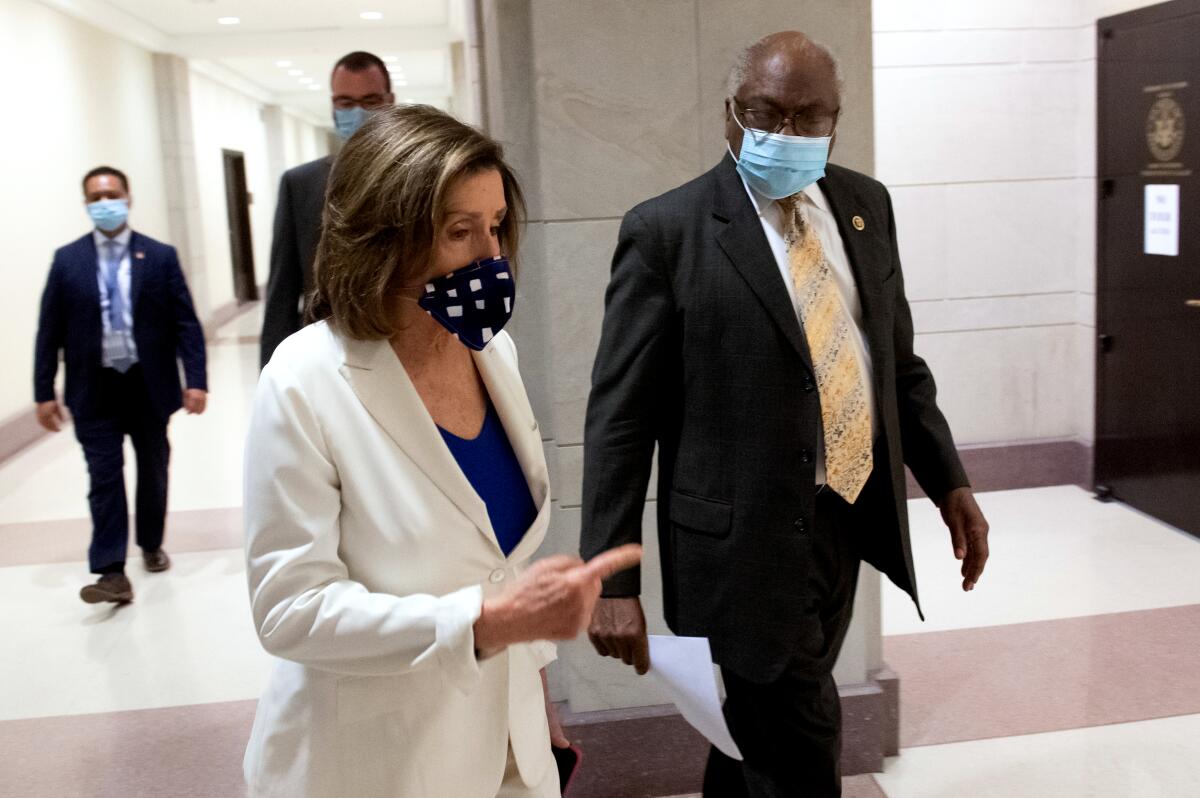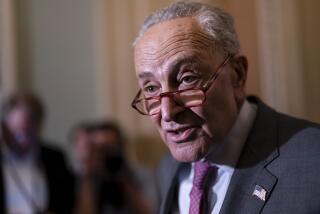House Democrats outline their next coronavirus relief bill, but GOP says it’s too soon to act

- Share via
WASHINGTON — House Democrats on Tuesday released a $3-trillion proposal that would provide payments to local governments and another round of $1,200 checks to individuals to help them weather the impact of the coronavirus, a plan that Republicans have already brushed off as too expansive and costly.
Members of the House are expected to come back to Washington on Friday to vote on the bill.
Democrats wrote the bill without negotiations with the White House or Republicans, meaning the legislation is more of a Democratic wish list and will need to be changed to pass the GOP-led Senate and be signed by President Trump.
Republicans have signaled they have no interest in enacting a new coronavirus response bill anytime soon, meaning passage of a law could be weeks away, despite mounting unemployment and mortality figures.
“This is nothing more than a messaging exercise by House Democrats,” said Sen. John Thune of South Dakota, the second-ranking Republican in the Senate.
Democrats’ strategy has been focused on the idea that the public is eager for more government support and programs — not less — and that Americans will favor their expansive, 1,815-page proposal.
“It was clear from the very beginning of this pandemic that its tragic consequences and scope and impact on the American people and the global community [meant] that robust response was essential,” House Majority Leader Steny Hoyer (D-Md.) said Tuesday.
But while Republicans derided the package as a liberal fantasy measure, progressives are not yet embracing it, squeezing Democratic leaders from both ends of the political spectrum. The co-chairs of the Congressional Progressive Caucus, Reps. Pramila Jayapal and Mark Pocan, asked Pelosi to delay the Friday vote so Democrats can debate its merits in person. In a letter to Pelosi, they wrote that they should have time to discuss the bill and any changes “that might be needed to ensure that it truly reflects the priorities and work” of all House Democrats.
Their top priority has been funding to help employers cover payroll costs for employees.
But other progressives, including Sen. Kamala Harris (D-Calif.) and the group of freshman Democrats known as the “squad” — Reps. Rashida Tlaib (D-Mich.), Alexandria Ocasio-Cortez (D-N.Y.), Ilhan Omar (D-Minn.) and Ayanna Pressley (D-Mass.) — want to see a new recurring monthly payment.
Called the Heroes Act, the centerpiece of the plan is more than $900 billion for state and local governments. Democrats have focused on ensuring local governments have funding to pay public workers, including transit employees, police officers, firefighters and teachers. Republicans are skeptical of such spending, saying they don’t want to “bail out” state governments that were in a dire financial picture before the COVID-19 pandemic.
It provides a second round of $1,200 economic stimulus payments — expanding the list of people eligible — and extends enhanced unemployment benefits through January.
The bill also provides $200 billion in hazard pay for healthcare workers; $75 billion to expand testing and contact tracing; student loan relief; $175 billion in mortgage and rent help; $14 billion for food assistance; and more than $3 billion for the November elections to be conducted by mail. It also provides $25 billion for the U.S. Postal Service, which is in financial trouble.
Senate Majority Leader Mitch McConnell (R-Ky.) said Monday that he doesn’t feel there is a need for an immediate bill.
“I don’t think we have yet felt the urgency of acting immediately,” he said. “That time could develop, but I don’t think it has yet.”
McConnell said Tuesday that he’s discussing next steps with the Trump administration. When they make a decision to proceed, “that will be the time to interact with the Democrats.”
Republicans’ top priority is protecting healthcare companies and employers from lawsuits from patients, workers and customers who are exposed to COVID-19. They have not yet released a plan, but McConnell said Tuesday that it will include enhanced medical malpractice protections for healthcare providers on COVID-19 cases.
Hoyer identified funding for state and local governments, and payments to individuals as the top priorities for House Democrats when bipartisan negotiations get underway.
“That would be a red line for us because that’s what we think is critically important,” Hoyer said.
Also Friday, Democrats are expected to approve a measure to allow the House to conduct some of its business remotely.
House rules require lawmakers to be in the House chamber to vote on legislation. Under the new plan, which Republican leaders oppose, lawmakers would be able to give another member their proxy to vote on their behalf in the chamber during the pandemic.
The proposal would also allow House committees to do some of their business — including oversight — remotely.
More to Read
Get the L.A. Times Politics newsletter
Deeply reported insights into legislation, politics and policy from Sacramento, Washington and beyond. In your inbox three times per week.
You may occasionally receive promotional content from the Los Angeles Times.











